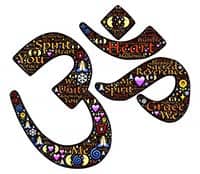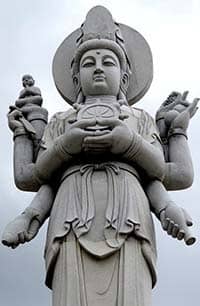Hinduism
 It is a well-known fact that the majority of the population of India is Hindus. This is about 80%. In addition, about 30 million people outside India also are the followers of Hinduism. Together they make a figure in approximately 900 million throughout the world. This is the third largest religion in the world. Only Christianity and Islam have greater amounts of followers.
It is a well-known fact that the majority of the population of India is Hindus. This is about 80%. In addition, about 30 million people outside India also are the followers of Hinduism. Together they make a figure in approximately 900 million throughout the world. This is the third largest religion in the world. Only Christianity and Islam have greater amounts of followers.
The meaning of this term is quite interesting, because it includes multiple traditions that are in close relations to one another. Already this creates some kind of intrigue about this religion. Nonetheless, there is no firm and united set of beliefs. Everything is pretty individualized.
The name was received form the Persian word "hindu", which means "river". It was referred to certain people who lived in the Indus River Valley. Hindus followers tell that their religion is infinite and they oblige themselves to strictly follow all the doctrines and fulfill the duties. Of course, as there is no single order of traditions, the duties differ according to the class and stage of life.
There is no clarity of the precise date of foundation this religion. You will not find its founder as well. The most ancient texts of Hindu remain unnamed. However, the scientists are capable to name an approximate age of Hinduism, which reaches about 4 thousand years. This amazing age make this religion the most ancient one in the world history. This is an interesting evidence that this religion is actually eternal.
It is a well-known fact that Indians are dedicated either to Shiva or Vishnu. This is there only true God. In the meanwhile, other identities look inward to the divine Self. The system of organization is very varied. Nevertheless, the majority recognizes Brahman who determines Supreme Reality and is the uniting factor.
The Vedas are holy texts of the ancient times in the country history, which are highly valued by most Hindus. They greatly respect the Brahmans. However, there are some that deny both authorities. All-in-all, these identities dedicate their lives to one God or a few ones, to family duties and concentration of meditation. Accordingly, it is necessarily to generalize the meaning "Hinduism" and "Hindu beliefs".
The first sacred manuscripts of the most ancient religion of the world date approximately 1200 BCE. These texts tell about different sacrifices that had been done in honor of multiple gods. Those were the representatives of natural forces. In the period of 700 BCE appeared more philosophical directions and thoughts. Afterwards, in the period of 500 BCE, in the system of Hinduism were introduced Buddhism and Jainism, which are definitely very famous and significant.
Finally, Hinduism had reached even the lands of the West countries in the course of the 20th century. This religion has received a quick popularity and engaged many followers. The main reason to that is great tolerance to different beliefs. In comparison to traditional Western religions, Hinduism allows finding actually what you wish and not what you are obliged to believe in. Of course, this religion is different to others. Nevertheless, it has a significant influence upon the further development and movements of others. At times, this influence is even indirect. The elements of Hindu thought can be noticed in multiple books and heard at many seminars in spiritual world of people from different corners of the globe.
Hindu Beliefs
As it has been already stated above, this religion is constructed with different beliefs, which is not too easy to understand by Western customs. Some identities cannot accept such happening. Hindu philosophy teaches that there are multiple ways for reaching life aims and finding the truth. We all are different and each of us has his/her own path. There is one truth. Simply we call it in different manners.
Notwithstanding, there are definite beliefs that are systemized and clearly identify Hinduism. They determine the boundaries of the religion outside, where remain other things. It goes without saying that the Vedas and the Brahmans are included to this list. Alongside with them goes reincarnation, for Hindus believe that human soul is immortal and it only changes its shapes. After death, it passes into another body. In addition, there is karma. It defines destiny of the present life, as well as of the future one. These beliefs are undeniable.
Have you noticed that the belief in God or several gods was not added to that list? This strongly contrasts with other religions of the world, who always place this very belief in the first position. Of course, the majority of Hindus are actually devoted to the existence of gods. Nonetheless, such beliefs are simply manifestations of one Supreme Reality. This is a policy of tolerance to diversity.



